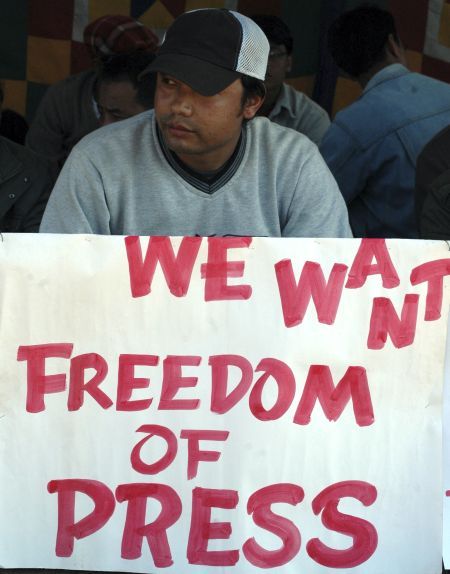 Just because one can (so far) criticise the government, or expose a corruption scandal, or question bureaucrats, does not mean we have freedom of speech, argues Sherna Gandhy.
Just because one can (so far) criticise the government, or expose a corruption scandal, or question bureaucrats, does not mean we have freedom of speech, argues Sherna Gandhy.
Just how valuable freedom of speech is in some countries has been demonstrated by the Charlie Hebdo affair.
Here in India, we don't really know what freedom of speech/expression means. As several filmmakers, artists, writers, journalists, and activists here know only too well, freedom of speech is daily under attack, and no one bats an eyelid. All it's good for is a shouting match on television occasionally (and selectively).
It struck me watching the news on foreign television channels in the past few days, that the freedom of speech in France and perhaps some other democracies, includes the freedom to insult, and no one and nothing is immune from being satirised.
The Charlie Hebdo cartoons do this openly. The Catholic Church apparently has launched several lawsuits against the satirical publication and so have several other religious and non-religious entities.
The French government, which has itself been a target many times, has not reacted by shutting down the publication or banning editions.
This is, of course, a curiously Western phenomenon, where for example even the president of the United States makes fun of himself in a skit he pens himself, and is made fun of by other guests, at the annual White House Press Corps dinner.
It is a matter of 'culture' that in India, insulting or poking fun at a public figure or religion would not be tolerated even by the more liberal members of the public.
I think many of us would say that Charlie Hebdo should not have published those insulting cartoons (though no one except the extremist loonies of all religious and political hues would advocate shooting the authors).
Our problem is quite different. Of course, we have plenty of hate speeches and insulting pronouncements by political and self-appointed cultural leaders. Sometimes they are pulled up for it and sometimes they are let off with nothing more than a noisy television 'debate' to show for it.
But we do something more damaging to the freedom of speech when we ban books, films, paintings and other forms of media and expression, officially and unofficially.
These bans and fatwas are not because there is anything actually insulting in the content, but because various entities in this country imagine that there is, or because the content harms some political or religious entity with the truth of its revelation.
Two most recent examples in a long list of similar ones is the ruckus over the film PK and a college in Maharashtra chickening out of showing a film that gives a very ugly, but as we all know, truthful, picture of the Ram temple shenanigans of the current ruling party and its affiliates.
Banning Salman Rushdie's novel and the author himself for a number of years, ditto for Tasleema Nasreen, the vandalisation of the work of M F Husain and his exile, the trashing of the respected Bhandarkar Oriental Research Institute, forcibly stopping the shooting of a film that showed the sorry plight of Hindu widows, arresting two young women for being less than adulatory of a leader on Facebook... even the recent burning of an effigy of a well-known journalist for reporting that the Pakistani boat chased down by the Coast Guard in Indian waters was manned by smugglers not terrorists, are other cases that come most readily to mind.
Censorship and intimidation of this kind -- for all sorts of stupid and imaginary reasons and not because the authors actually insulted or harmed anyone or instigated any violence -- should never be tolerated in any self-respecting democracy. Yet, it has been done and continues to be done with alarming frequency in our country.
More alarming is the fact that most Indians are complacently convinced that freedom of expression exists in this country, and show little indignation when books, films and paintings are vandalised or forced to go off the shelves and their authors are intimidated.
No one stands up to this kind of intimidation and muzzling, not even the victims, because they are unlikely to get any support either from their peers, or the public, or the law and order apparatus, or the government -- any government -- which in fact is only too ready to either ban or look the other way.
Just because one can (so far) criticise the policies of the government, or expose a corruption scandal, or question bureaucrats, does not mean we have freedom of speech.
I am not an advocate of untrammelled freedom of speech of the Charlie Hebdo variety (India really has to change before that can happen).
But there is nothing of that sort happening here and yet we have bans, threats and violence of a mindless kind in order to stop people from expressing their opinions just because these run counter to their own.
A rigorous process of scrutiny should be initiated before anything is banned or censored and if a 'law and order' problem is feared, then the law and order machinery should be strong enough to deal with it and should be supported fully by its political masters.
Not least, the Indian public -- at least that part of it that doesn't live in the 13th century -- needs to introspect a little more and to acknowledge that we need a more enlightened approach to freedom of speech and, like the Parisians, should come out in support of it.
Photograph: Jinendra Maibam/Reuters










